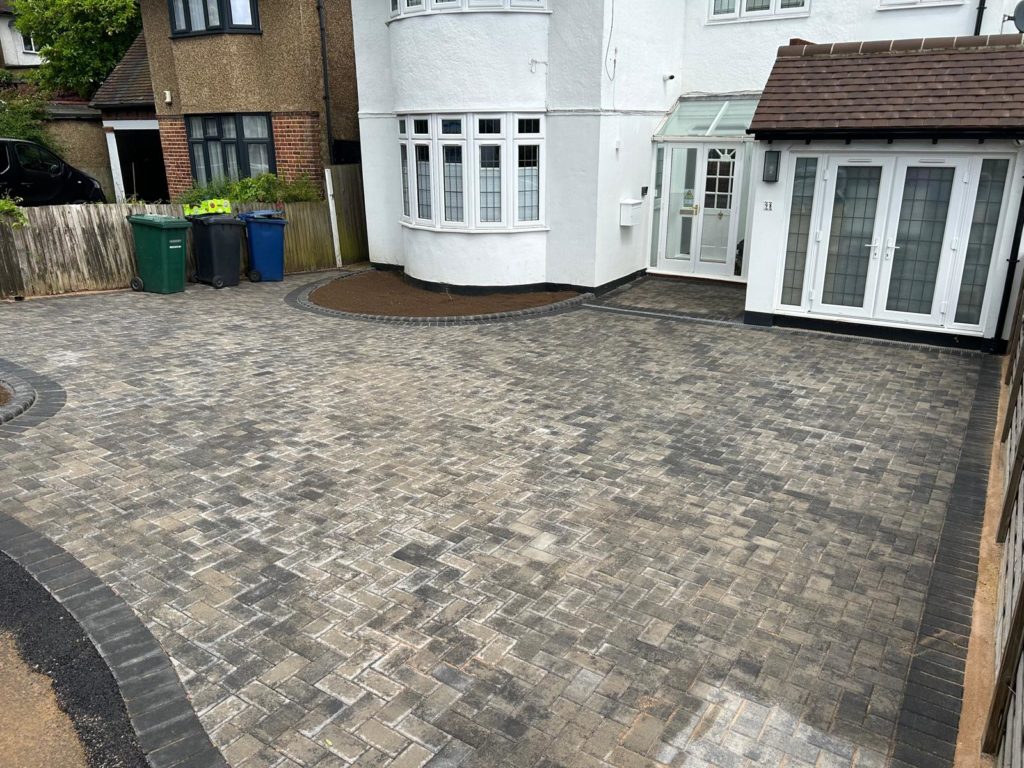Choosing the right material for your driveway isn’t just about picking what looks nice. It’s about finding the perfect balance between appearance, durability, maintenance, and budget. With so many surface options available, it can feel overwhelming to know where to start. But don’t worry – we’re here to make things simple.
In this guide, we’ll walk you through the most popular driveway materials, breaking down their benefits, quirks, and ideal settings. Whether you’re after something sleek and modern or practical and rustic, this guide will help you make an informed choice that suits both your home and your lifestyle.
What Are Your Driveway Surface Options?
Here’s a breakdown of the five most common driveway surface options, with the advantages and reasons for choosing each.
Resin – Resin is UV stable, highly decorative, and comes in a wide range of colours. It must be kept clean to maintain its shine, but contrary to popular belief, no specialist tools are needed. A simple hose-down will do the job. Resin driveways can look fantastic for many years. Depending on your chosen colour and style, a resin driveway can look as clean and polished as a kitchen worktop.
Tarmac – Tarmac is hard-wearing and suitable for heavy traffic, whether vehicles or footfall. It’s incredibly durable and works well in muddy, rural areas. One downside is that it fades over time. While freshly laid tarmac is a deep black, it gradually turns grey due to exposure to sunlight. Contrary to what many believe, this fading isn’t due to dirt but the effect of UV rays.
Block Paving – Block paving is decorative and available in a wide range of bright colours. It’s also excellent for creating patterns. However, it requires more upkeep than the other options. Regular weeding and cleaning are necessary, and to keep it in top condition, you’ll need to refresh the sand between the blocks every few years. The sand, being a type of soil, encourages weed growth rather than preventing it. Block paving can last a long time if maintained properly
Tar and Chip – Tar and chip is the most common driveway surface in Suffolk and other rural areas. It’s low cost, can be laid quickly, and has a rustic charm. However, it typically needs to be replaced every three to four years.
Natural Stone – Natural stone is a premium surfacing material that can appear either traditional or modern, depending on your choice of stone. For example, old York stone suits period properties, while more colourful stones can complement modern architecture. Natural stone is very durable, but it is also the least practical of all the options.

What Should Influence Your Material Choice?
Budget
Budget plays a significant role. Resin is the most expensive, while tar and chip is the most affordable. Block paving and tarmac are similarly priced, which may come as a surprise. This is due to the varying costs of raw materials and the differing labour times to install them.
Setting
Your location should influence your choice. Resin is popular in urban areas and is frequently requested in Essex. In contrast, tar and chip is often chosen in rural Suffolk and Norfolk. If your driveway will support heavy vehicles or endure muddy conditions, tarmac is likely your best bet.
Maintenance
For low maintenance, resin and tarmac are excellent choices. They only require occasional brushing or light cleaning. Block paving, in comparison, demands more upkeep. Natural stone falls somewhere in between – it requires some care, but not as much as block paving.
Aesthetic Goals
If a modern, clean look is what you’re after, resin is probably the right choice. It comes in many colours and stone mixes, making it ideal for high aesthetic demands. For a more traditional appearance, block paving or natural stone will likely be more suitable.
How Long Will Each Type of Surface Last?
- Resin: Over 10 years. It remains decorative with only light maintenance.
- Tarmac: Around 8 years. It’s hard-wearing and cost-effective over time.
- Block Paving: Approximately 6 years with proper maintenance. Neglect will reduce its lifespan.
- Tar and Chip: Typically lasts 3 to 4 years, though it may begin degrading sooner.
- Natural Stone: The longest-lasting option. Depending on the type, it can last 10, 20, or more years.
To evaluate cost-effectiveness, consider the cost per year. While natural stone may have a higher initial cost, its longevity can make it more economical over time.
A Few Final Thoughts
Consider how much use your driveway gets. How heavy are your vehicles? How many will be using the driveway? How resilient does it need to be?
Do you want your driveway to match the style of your home or your lifestyle? All the surfaces we’ve discussed offer some flexibility in appearance. If you have very specific aesthetic preferences, those should steer your decision.
Finally, always seek professional advice. Don’t rely solely on online searches or neighbourly suggestions. Your driveway is a long-term investment, so consult a professional for tailored advice.
If you would like to speak to us about choosing the right material for your driveway or to get a no-hassle, quick quote, please call us on 01787 869 974 or get in touch via our contact page.

